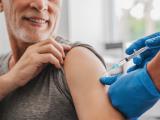New studies on respiratory syncytial virus (RSV) in both adults and young children show that infections are linked to a higher risk of death in adults, and children born prematurely or with pulmonary or neurologic conditions are at greater risk of severe RSV infections.
In research presented this week during the annual Congress of the European Society of Clinical Microbiology and Infectious Diseases meeting in Vienna (ESCMID Global 2025), researchers presented new data showing that adults with RSV acute respiratory infections face a 2.7-fold higher risk of death within 1 year of infection.
And, in a cohort study of children hospitalized with RSV in 2022 and 2023 published in in JAMA Network Open, severe RSV disease was more likely among those age 2 or older with pulmonary and neurologic, neuromuscular, or developmental conditions; for younger kids, age younger than 6 months and prematurity were the main risk factors.
Adults with asthma, COPD see severe outcomes
At ESCMID, researchers said their findings underscore the very real threat RSV poses to older adults.
The research comes from a Danish nationwide cohort study of 5,289 adults (18 years and older) diagnosed as having RSV acute respiratory infection (RSV-ARI) from 2011 to 2022. Those patients were compared to 15,867 matched controls from the general population. Clinical and economic outcomes were assessed 1 year following RSV-ARI onset.
During the follow-up period, in addition to increased risk of death, exacerbations of COPD (chronic obstructive pulmonary diseases) and asthma were 3.1 and 4.6 times more frequent in RSV-ARI patients, respectively.
Hospitalization rates for RSV-ARI patients were more than double those of the control group (57% versus 28%), and intensive care unit admissions were nearly four times higher (5.3% versus 1.4%), according to a press release from ESCMID.
Even after the acute phase, patients continued to experience worse outcomes compared to the general population.
"One of the most striking findings from this study was the prolonged and significant impact of RSV-ARI,” said lead study author, Maria Joao Fonseca, PhD, a researcher with drug company GSK, which makes the Arexvy RSV vaccine. "Even after the acute phase, patients continued to experience worse outcomes compared to the general population."
The authors said targeting RSV vaccination among older adults who have COPD or asthma would be a cost-saving measure. The study was sponsored and funded by GSK.
Prematurity puts babies at risk
In JAMA Network Open, an observational cohort study conducted at two Canadian hospitals showed prematurity, as well as neurologic, pulmonary, and developmental delays, were associated with more severe RSV-AIR, especially in infants 6 months and younger.
Severe disease was defined as a composite variable of noninvasive ventilation (continuous or bilevel positive airway pressure), invasive mechanical ventilation, or death during hospital admission.
The study was conducted in 2022 and 2023 and included 709 case-patients (median age, 13.1 months; 442 boys [62.3%]) who were admitted with RSV-associated ARI. Of the patients, 452 (63.8%) were younger than 2 years, and 257 (36.2%) were aged 2 years or older.
Patients with severe disease were younger than those with nonsevere disease (median age, 2.6 months compared to 18.6 months).
Pulmonary disease and use of home oxygen were associated with severe infection (adjusted risk ratio [ARR], 2.47; 95% confidence interval [CI], 1.30 to 4.68) and neurologic, neuromuscular, and developmental conditions (ARR, 1.89; 95% CI, 1.03 to 3.49) were associated with severe disease among children aged 2 years or older.
Prematurity was also associated with severe disease in those 2 years and younger (ARR, 1.40; 95% CI, 1.03 to 1.89).
"As health systems move toward universal prevention in infancy, our study supports this approach and suggests the potential added benefits associated with monoclonal antibody therapies for children aged 2 years or older in high-risk groups," the authors concluded.




















